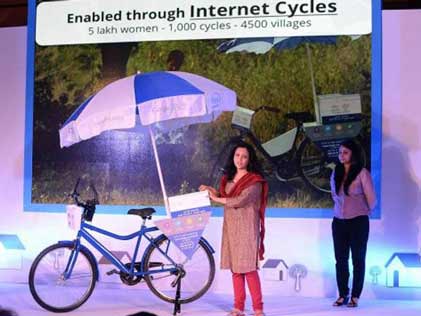MUMBAI: In an innovative move to educate rural women about the internet, Tata Trusts and Google India announced a special programme to send 1,000 specially designed ‘Internet Cycle Carts’ to remote villages.
Built on the back of a regular bicycle, the carts are modelled on India’s traditional distribution system used to ferry everything from ice-creams to industrial goods and will help empower the rural communities.
The cycle cart operator or ‘Internet Saathi’ would train women and act like the postman, who was the single point contact for the village with the outside world both for information and communication.
The Internet Saarthi progame
The programme seeks to empower women and their communities in rural India by enabling them to use the Internet and benefit from it. The joint initiative is aimed at bridging the technology gender divide, which currently puts women in rural India at further risk of getting left behind as the world around them benefits from Internet. The initiative will provide basic training on the usage and benefits of the Internet for women through specially designed Internet cycle carts that will visit villages to provide easy access to women. Built on the back of a cycle, it is a cart modelled on India’s traditional distribution system that is used to carry everything from ice-cream to industrial supplies. The operator or the ‘Internet Saathi’ who trains the women, would be akin to the village postman of yore who was the single point contact for the village with the outside world for both information and communication.
The Internet cart will be in the village for a minimum of two days every week for over six months. It will create awareness and also try to ensure adequate training is provided to use devices till women use devices independently. Once the cart has completed the training in a cluster of three villages, it will be moved to the adjoining cluster. Training of women and the community at large would be ensured by involving local NGOs and groups as trainers.

